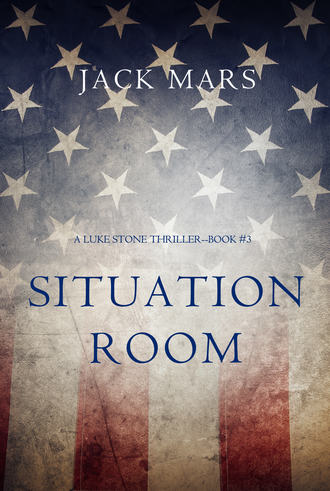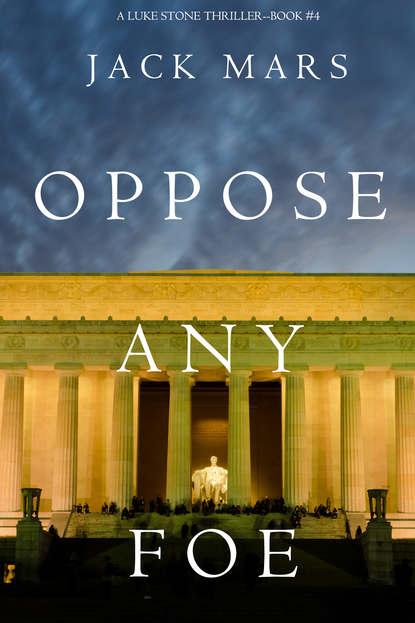
Полная версия
Situation Room
“Do you think we can do something like this with Mom one day?”
Luke stared out at the sea. Questions like that made him want to jump off this cliff. “I hope so.”
Gunner perked up at the slightest hint of possibility. “When?”
“Well, you have to understand that your mom and I are having a little disagreement right now.”
“I don’t understand,” Gunner said. “You love each other, right? And you promised you were going to quit your job, right? Did you really quit?”
Luke nodded. “I did quit.”
“See, Mom doesn’t believe that.”
“I know it.”
“But if you can make her believe it, then…”
Luke had quit, all right. He had quit and gone completely off radar. Susan Hopkins had promised to leave him alone, and she had honored that promise. He had also been out of touch with his old group at the Special Response Team.
The truth was, he was enjoying his time away. He had gone back to basics. He rented a cabin in the Adirondack Mountains for two weeks and spent nearly the entire time bow hunting and fishing. He bathed by jumping off the cabin’s back dock each morning. He grew a beard.
After that, he spent ten days in the Caribbean, solo sailing through St. Vincent and the Grenadines, snorkeling with sea turtles, giant stingrays, and reef sharks, and diving a couple of shipwrecks from more than a hundred years ago.
At the end of each little trip, he would give himself a day to make it back to Washington, DC, and pick up Gunner for the next dad and son adventure. Luke had to admit, being retired agreed with him. A year from now, when he ran out of money, it wasn’t going to be all that agreeable, but for now, he couldn’t think of a bad word to say about it.
“Are you and Mom going to split up for good?”
Luke detected the slightest tremble in Gunner’s voice when he asked that question. He got it, he really did. Gunner was afraid. Luke sat down on the rocks with him.
“Gunner, I love both you and your mom very much. The situation is complicated, and we’re working through it the best we can.”
That wasn’t necessarily true. Becca was cold to Luke. She wanted a divorce. She wanted full custody of Gunner. She thought that Luke was a danger to Gunner and to her. She had practically threatened to get an order of protection against him. She was being unreasonable, and she came from a family with a lot of money. She could pay for a long and bitter custody battle, if need be.
“Do you want to be with her?”
“Yes, I do. Of course I do.” It was the first lie Luke had told Gunner in this conversation. The truth was harder to ascertain. At first, he had. But as time passed, and Becca’s position hardened, he became less sure.
“Then why don’t you just come to the house and tell her? Send her roses or something, like every day?”
It was a good question. It didn’t have a simple answer.
Inside Luke’s backpack, a telephone started ringing. It was probably Becca, wanting to talk to Gunner. Luke reached inside the pack for the satellite phone he kept with him at all times. It was the only nod toward remaining on grid that he had made. Becca could always reach him. But she wasn’t the only one. There was one other person on Earth who had access to this number.
He looked at who was calling. It was a number he didn’t recognize, from the 202 area code. Washington, DC.
His heart dropped.
It was her. The other person.
“Is it Mom?” Gunner said.
“No.”
“Is it the President?”
Luke nodded. “I think so.”
“Don’t you think you better answer it?” Gunner said.
“I don’t work for her anymore,” Luke said. “Remember?”
This morning, before they had left to come on this hike, they had watched TV news footage of the dam failure in North Carolina. More than a hundred confirmed dead, hundreds more missing. An entire mountain resort had been washed away by a wall of water. Towns downstream from there were being evacuated and sandbagged as fast as possible, but there were likely to be more casualties.
The incredible thing was a dam built in 1943 had simply malfunctioned after more than seventy years of nearly perfect operations. To Luke, that smelled like sabotage. But he couldn’t imagine who would want to target a dam in such a remote area. Who would even know it was there? If it was sabotage, then it was likely a local issue, some group of militia members, or maybe environmentalists, or maybe even a disgruntled former employee, pulling a stunt that went horribly wrong, and with tragic consequences. The state police or North Carolina Bureau of Investigation would probably have the bad guys in custody by the end of the day.
But now the phone was ringing. So maybe there was more to it.
“Dad, it’s okay. I don’t want you to quit your job, even if Mom does.”
“Is that so? What if I want to quit? Don’t I get any say in the matter?”
Gunner shook his head. “I don’t think so. I mean, a lot of people died in that flood, right? What if I was one of them? What if Mom and me both died? Wouldn’t you want someone to figure out why it happened?”
The phone went on and on, ringing. When voice mail picked up, the phone stopped ringing for a few seconds, paused, and then started ringing again. They wanted to speak to Luke, and they weren’t going to leave a message.
Luke, thinking of Gunner’s words, pressed the green button on the phone. “Stone.”
“Hold for the President of the United States,” a male voice said.
There was a moment of silence, and then her voice came on the line. She sounded harder than before, someone older. The events of the past few months would age anyone.
“Luke?”
“Hi, Susan.”
“Luke, I need you to come in for a meeting.”
“Is this about the dam failure?”
“Yes.”
“Susan, I’m retired, remember?”
Her voice lowered.
“Luke, the dam was hacked. Hundreds of people are dead, and all signs point to the Chinese. We are on the verge of World War Three.”
Luke didn’t know how to respond to that.
“What time will you be here?” she asked.
And he knew it was not a question.
CHAPTER FOUR
6:15 p.m.
United States Naval Observatory – Washington, DC
Luke rode in the back of the black SUV as it pulled into the circle in front of the stately, white-gabled 1850s Queen Anne–style residence that for many years had been the Vice President’s official residence. Since the White House was destroyed two months before, this place had served as the New White House, which was fitting because the President had lived here for five years before taking on her new role.
The two months Luke had been away, he almost never thought about this place, or the people inside. He kept the satellite phone with him at the President’s request, but for the first few weeks, he lived in dread of receiving a call. After that, he almost forgot he even had the phone.
A young woman met him on the walkway in front of the house. She was brunette, tall, very pretty. She wore a no-nonsense black skirt and jacket. Her hair was tied back in a tight bun. She carried a tablet computer in her left hand. She offered Luke the other hand. Her grip was firm, all business.
“Agent Stone? I’m Kathryn Lopez, Susan’s chief-of-staff.”
Luke was a little taken aback. “Are they recruiting chiefs-of-staff right out of high school these days?”
“Very kind of you,” she said. Her voice was perfunctory. It told him she got that all the time, and most of the time it wasn’t intended to be kind. “I’m thirty-seven years old. I’ve lived in Washington thirteen years, since right after I finished my master’s degree. I’ve worked for a Representative, two Senators, and the former Director of Health and Human Services. I’ve been around the block a couple times.”
“Okay,” Luke said. “I’m not worried about you.”
They moved through the front doors. Inside the doors, they were confronted by a checkpoint with three armed guards and a metal detector. Luke removed the Glock nine-millimeter from his shoulder holster and placed it on the conveyor belt. He reached down and unstrapped the small pocket pistol and the hunting knife taped to his calves and placed those on the belt as well. Finally, he took his keys from his pocket and dropped them on there with the weapons.
“Sorry,” he said. “I don’t remember there being a security checkpoint here.”
“There wasn’t,” Kat Lopez said. “It’s only been in for a few weeks. We’ve got more and more people coming here as Susan gets a grip on her duties, and security has formalized.”
Luke remembered. When the attacks came, and Thomas Hayes died, Susan was suddenly elevated to the Presidency. The White House had been mostly destroyed, and everything – all arrangements, all logistics – had an ad hoc, almost desperate quality to them. Those had been crazy days. He was glad for the time off since then. It was a little amazing that Susan hadn’t had any at all.
After the guards took Luke aside and gave him an extra pat-down and a quick skim with a metal-detecting wand, he and the chief-of-staff moved on.
The place was bustling. The foyer was crowded with people in suits, people in military uniforms, people with their sleeves rolled up, people walking fast through the hallways, trailing gaggles of assistants. One thing was obvious right away – there were a lot more women here than before.
“What happened to the last guy?” Luke said. “He used to be Susan’s chief-of-staff. Richard…”
Kat Lopez nodded. “Yes, Richard Monk. Well, after the Ebola incident, both he and Susan agreed that it was a good time for him to move on. But even though he’s out of here, he landed on his feet. He’s working as chief-of-staff for the new United States Representative from Delaware, Paul Chipman.”
Luke knew there were new Representatives and Senators coming in from thirty-nine states to replace the ones lost in the Mount Weather attack. It was a blizzard of people moving up from the minor leagues, or coming back from retirement. More than a few were the appointees of state governors with questionable ethics and long-established patronage systems. There were greasy palms all over the place.
He smiled. “Richard went from working directly with the President to working with a freshman rep from the second smallest state in the union? And you call that landing on his feet? It sounds like he landed on his head.”
“No comment,” Kat said, and almost smiled. It was the closest thing to humanity she had given him so far. She led him through the crowds to a double doorway at the end of the hall. Luke already knew the place. When Susan was Vice President, the large sunlit chamber had been her conference room. In the days after she took the oath of office, it rapidly transformed into an on-the-fly Situation Room.
It had been formalized, too. Modular walls ran the length of the room, covering the old windows. Giant flat-panel video screens had been mounted at five-foot intervals. A larger oak conference table had been brought in, and on the wall behind the head of it was the Seal of the President. There were about two dozen people inside when Luke and Kat walked in, a dozen at the conference table, and more in chairs lining the walls.
The gender change was evident here as well. Luke remembered sitting in here being briefed about the missing Ebola sample two months ago. Of the thirty people in the room at that time, Susan might have been the only woman. Twenty-nine men, half of them big and burly, and one small woman.
Now maybe half the people were women.
Susan rose from the head of the table when Luke walked in. She was different, too. Harder, perhaps. Thinner than before. She had been a fashion model in her earlier life, and she had carried baby fat on her cheeks right into middle age. That was gone now, and she seemed to have developed crow’s feet around her eyes almost overnight. The bright eyes themselves seemed more focused, like laser beams. She had spent her entire life as the most beautiful woman in the room – by the time this presidency was over, that might no longer be the case.
“Agent Stone,” she said. “I’m glad you could join us.”
He smiled. “Madam President. Please. Call me Luke.”
She didn’t return the smile. “Thank you for coming.”
Standing at one of the large screens was Kurt Kimball, Susan’s National Security Advisor. Luke had met him once before. He was tall with broad shoulders. His head was perfectly bald.
Kimball offered him a handshake. If Kat Lopez’s shake was firm, Kurt Kimball’s was granite. “Luke, good to see you.”
“Kurt, likewise.”
The atmosphere was tense. These people hadn’t spent the past two months camping and sailing. Even so, Luke had flown down here from Maine at a moment’s notice, and dropped his son off with his angry, soon to be ex-wife, who saw all of this as reinforcement of the reasons she was divorcing him. You might think they’d offer him a little more warmth.
He decided to go with the flow. Hundreds of people had died this morning, and the people in this room, as least, thought it was a terrorist attack.
“Shall we get down to it?” he said.
“Please have a seat,” Kimball said.
A seat at Susan’s right flank had miraculously appeared, and Luke took it.
On the screen, a photo of a large dam appeared. Large wasn’t quite the word. Massive was more to the point. A six-story building sat in front of the dam, the control center, with six partially open floodgates below it. The building was dwarfed by the dam rising behind it. Along the edge was a hydroelectric power generating station with row after row after row of transformers.
“Luke, this is Black Rock Dam,” Kurt Kimball said. “It is approximately fifty stories tall and impounds Black Rock Lake, which is sixteen miles long, four hundred feet deep, and at any given time holds about ten billion cubic feet of water. As you probably saw on the news, just after seven a.m. this morning, the six floodgates you see along the bottom opened fully, and remained locked open for three and a half hours, until technicians could de-couple them from the computer system that operates them, and finally close them manually.”
Kimball used a laser pointer to indicate the floodgates.
“If you look at the gates in relation to the building, you will see that they are quite large. Each one is ten meters tall, which means that six three-story-high jets of water were released all at once. The water pressure of Black Rock Lake sent the flood downstream at approximately twenty miles per hour, which doesn’t sound all that fast until you’re standing in front of it. Until this morning, the Black Rock Resort stood three miles south of the dam. The resort was made almost entirely of wood. The initial wall of water completely destroyed the resort, and as far as we know, the only survivors were a handful of people who left early to hike to the top of the dam, or to take drives on nearby scenic roads.”
“How many people were staying at the resort?” Luke said.
“There were two hundred and eighty-one guests listed in their online reservations system. Perhaps twenty of them either left the resort before the flood, or never arrived there for one reason or another. All of the others were swept away and are assumed dead. Combined with other disasters downstream, it will be several days before we have any kind of accurate body count.”
Luke got that odd familiar feeling. It returned like an old friend, one that you hadn’t seen in a while and were hoping not to see anymore. It came as a sickness in the pit of his stomach. It was death, the deaths of innocent people, minding their own business. Luke had dealt with it for far too long.
“Did anyone try to warn them?” he said.
Kimball nodded. “Workers in the dam’s control center called the resort on the phone as soon as they realized the floodgates were open, but apparently the flood had already reached there by the time they got in touch with anyone. Someone did pick up, but the conversation ended almost immediately.”
“Jesus. And what were the disasters downstream you mentioned?”
A map appeared on the screen. It showed the lake, the dam, the resort, and additional towns nearby. Kimball indicated a town. “The town of Sargent lies another sixteen miles south of the resort. It’s a town of twenty-three hundred people, and a gateway for visitors to the National Park. Most of Sargent is situated on a small hill, and the town received slightly more warning than the resort. They got enough warning, in fact, that the town emergency sirens sounded before the flood came. With an added sixteen miles to travel, the floodwaters hit with somewhat less force in Sargent, and many of the houses and buildings in town withstood the initial force of the flood and were not washed away. Many of the low-lying houses were, however, quickly inundated. More than four hundred people from Sargent are currently missing and presumed dead.”
Luke stared at the screen as Kimball’s laser pointer fell on the towns of Sapphire, Greenwood, and Kent, each one somewhat farther from the dam than the one before, and each one the site of a disaster in its own right. The scale of it was devastating, and although the floodgates were closed, the flood itself was going to continue traveling south and downhill for the next several days. Two dozen towns had been evacuated, but more fatalities were practically guaranteed. Some people in remote areas wouldn’t leave, or couldn’t.
“And you think hackers did this? How is that possible?”
Kimball glanced around the room. “Does everyone here have clearance to hear this next part? Can we please sweep anyone out who doesn’t have clearance?”
Low murmuring went around the room, but no one moved. “Okay, I’m going to assume that anyone here belongs here. If not, it’s your ass. Remember that.”
He turned back to Luke.
“The dam was built in 1943 to generate much-needed electricity during the war. It was built and is operated to this day by the Tennessee Valley Authority. For most of the dam’s life, the floodgates were operated by controls less sophisticated than your garage door opener. About twenty years ago, TVA started looking at ways to save money by automating their dams. Control centers in old hydroelectric dams are incredibly inefficient by modern standards. You’ve basically got people there around the clock, and their jobs include reading and writing logbooks, and opening and closing the spillways from time to time. The floodgates are almost never opened.
“TVA was thinking they could aggregate ten or twenty dam control centers into one centrally located control center. So they retro-fitted several dams with computer software that can be operated remotely. Black Rock was one of them. We’re talking about very simple software – yes means open the gates, no means close them. For one reason or another, they never did create the central control center, but they did make the software internet-based, in case they ever decided to do so. The final nail, so to speak, is that the science of encryption barely existed at that time, and the software has never been updated since it was first installed.”
Luke stared, stunned.
“You’re kidding.”
He shook his head.
“It was easy to hijack this system. It’s just that no one ever thought to do it before. What terrorist would even know this dam exists? It’s in a remote corner of a rural state. You don’t get a lot of style points for attacking Sargent, North Carolina. But as we’ve discovered, the results are as devastating as if they had attacked Chicago.”
Susan spoke for the first time during Kimball’s presentation. “And the worst thing about it is there are hundreds of dams like this across the United States. The truth is we don’t even know how many there are, and how many are vulnerable.”
“And why do we think the Chinese did it?” Luke said.
“Our own hackers at NSA traced the infiltration to a series of IP addresses in northern China. And we traced communication with those addresses to an internet account at a motel in Asheville, North Carolina, sixty miles east of the Black Rock Dam. The communications took place in the forty-eight hours before the attack. A SWAT team from the Bureau of Alcohol, Tobacco, and Firearms operates in that region, raiding unlicensed distilleries and breweries. That team was diverted to the motel, did a takedown of the room in question, and arrested a thirty-two-year-old Chinese national named Li Quiangguo.”
An image of a Chinese man being led from a small nondescript motel by a group of tall and broad ATF officers appeared on the screen. Another image appeared of the same man standing on a narrow roadway across from a lake. He stood in front of a historic plaque that read Black Rock Dam – 1943, with a couple of paragraphs of description below.
“Although he has travel documents including a passport under this name, we don’t believe this is the man’s real name. As you know, the sequence of names in China is reversed – the surname comes first, followed by the given name. Li is one of the most common surnames in China, practically a generic name, similar to Smith in the United States. And Quiangguo, in Mandarin Chinese, means Strong Nation. This was a name with militaristic connotations that was very common after the Chinese Revolution, but fell into disfavor probably forty years ago. Further, Li was found with a handgun in his possession, as well as a small vial of cyanide pills. We believe he is a Chinese government agent, operating under an alias, who was supposed to kill himself if he was about to get caught.”
“So he got cold feet,” Luke said.
“Either that, or he just didn’t get to the pills in time.”
Luke shook his head. “After an operation like this one, an agent willing to kill himself would be holding the pill bottle in his hand, or have it in his pocket, twenty-four hours a day. What were the communications?”
“They were a series of encrypted emails. We haven’t broken the encryption yet, and it may be weeks before we do. It’s one they haven’t seen at NSA. Very complex, very tough to take down. So at this moment, we have no idea what the content of the emails is.”
“Is the man talking?” Luke said.
Kimball shook his head. “He’s being held in a cabin at a FEMA detention center in northern Georgia, about ninety miles southeast of the attack site. He insists he’s simply a tourist who was in the wrong place at the wrong time.”
“That’s why we called you,” Susan said. “We’d like you to go have a chat with him. We thought he might speak to you.”
“Have a chat,” Luke said.
Susan shrugged. “Yes.”
“Get him to talk?”
“Yes.”
“For that, I’ll probably need my team with me,” Luke said.
A look passed between Susan, Kurt Kimball, and Kat Lopez.
“Perhaps we’d better discuss that in private,” Kimball said.
*“Okay, Susan, so this is the part where you tell me again that the Special Response Team has been disbanded, right?”
“Luke…” she began.
They were sitting upstairs in Susan’s study. The study was just as Luke remembered it. A large rectangular room with hardwood floors and a white carpet in the middle. The carpet served as the focal point for a sitting area with big comfortable upright chairs and a coffee table.
One entire wall of the study was a floor-to-ceiling bookcase. The bookcase reminded Luke of The Great Gatsby.
And then there were the windows. Giant, gracious, floor to ceiling windows which gave expansive views of the Naval Observatory’s rolling grounds. The windows faced southwest and let in the afternoon light. The light was like something a master artist would try to capture.
The days were clearly getting shorter. Although it wasn’t yet 7 p.m., early evening sunlight streamed through her windows. The day was already ending. Luke thought again briefly of his interaction with Becca when he dropped Gunner off. He shook the image away. It was too much to think about.
He sat on the opposite side of the coffee table from the President. Kurt Kimball sat at an angle to both of them. Kat Lopez stood behind Susan and to her right.
“Yes,” Susan said. “There is no more Special Response Team. Most of the former staff have been absorbed into other roles within the FBI. At this point, it would be rather difficult to rebuild what you think of as your team.”
“Susan,” Luke said. “I’d like to remind you that you’re asking me to come out of retirement again. You know what I’ve been doing for the past two months? I’ll tell you. Camping, fishing, hiking, sailing. A little bit of hunting. A little bit of diving.” He rubbed his beard. “Sleeping late.”














